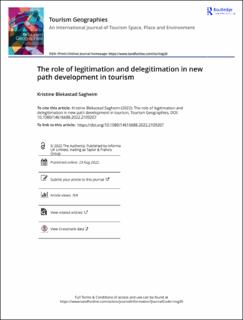| dc.contributor.author | Sagheim, Kristine Blekastad | |
| dc.date.accessioned | 2023-02-20T09:00:31Z | |
| dc.date.available | 2023-02-20T09:00:31Z | |
| dc.date.created | 2022-09-09T10:43:20Z | |
| dc.date.issued | 2022 | |
| dc.identifier.citation | Tourism Geographies: an international journal of tourism space, place and environment. 2022, . | en_US |
| dc.identifier.issn | 1461-6688 | |
| dc.identifier.uri | https://hdl.handle.net/11250/3052200 | |
| dc.description | © 2022 The Author(s). Published by Informa UK Limited, trading as Taylor & Francis Group | en_US |
| dc.description.abstract | The development of the tourism industry in regional contexts has attracted significant interest from tourism geographers, in which the evolutionary economic geography (EEG) approach has been of interest over the last decade. Recent research on EEG has emphasised the role of institutions and particularly legitimacy in new path development, claiming that legitimacy is crucial for the development of emerging industries. Against this backdrop, this paper explores the role of legitimation and delegitimation in the development of the sharing economy in Innlandet, a tourism region in Norway. The article poses two research questions. How is the legitimacy of Airbnb expressed by key tourism stakeholders in a tourism region in Norway? Moreover, how can the shifting roles of legitimation and delegitimation among key stakeholders in the tourism industry inform the literature on new path development? These issues are explored in qualitative interviews with respondents from four key tourism stakeholder groups: consumers, Airbnb hosts, incumbent firms, and regional industry and policy actors. The findings reveal legitimacy issues mainly related to regulatory and normative ambiguities, described by biased regulations that result in economic leakages to other regions and countries and concerns about decreasing local value creation in the region. These findings indicate that the sharing economy lacks legitimacy among the stakeholders. The article concerns the role of legitimation and delegitimation in new path development processes, arguing that delegitimation prevents transformative changes and path development processes. | en_US |
| dc.language.iso | eng | en_US |
| dc.rights | Attribution-NonCommercial-NoDerivatives 4.0 Internasjonal | * |
| dc.rights.uri | http://creativecommons.org/licenses/by-nc-nd/4.0/deed.no | * |
| dc.subject | legitimation | en_US |
| dc.subject | delegitimation | en_US |
| dc.subject | new path development | en_US |
| dc.subject | innovation | en_US |
| dc.subject | sharing economy | en_US |
| dc.subject | tourism | en_US |
| dc.title | The role of legitimation and delegitimation in new path development in tourism | en_US |
| dc.type | Peer reviewed | en_US |
| dc.type | Journal article | en_US |
| dc.description.version | publishedVersion | en_US |
| dc.subject.nsi | VDP::Samfunnsvitenskap: 200 | en_US |
| dc.source.pagenumber | 18 | en_US |
| dc.source.journal | Tourism Geographies: an international journal of tourism space, place and environment | en_US |
| dc.identifier.doi | 10.1080/14616688.2022.2109207 | |
| dc.identifier.cristin | 2050230 | |
| cristin.ispublished | true | |
| cristin.fulltext | original | |
| cristin.qualitycode | 1 | |

